Delve into the fascinating world of the smallest Koi fish with this comprehensive guide, tailored for enthusiasts wanting to keep these colorful fish in smaller pond settings.
With limited space you will be seeking advice on the smallest koi varieties that can be kept in small ponds or aquariums. In this article we identify the smallest koi fish varieties and we offer a guide to small koi pond design and care.
Koi fish are a long term commitment. They are hardy fish that are easy to take care of, although if allowed, they can reach a vast size requiring large spaces.
Smallest koi fish
Are you looking for small Koi for your aquarium or outdoor pond?
Small Koi generally refers to fish that are 15 inches or smaller in size, making them suitable for larger household aquariums.
Keeping small koi in an aquarium or pond will restrict its growth. Large ponds allow fish to grow to their full potential.
Small koi varieties
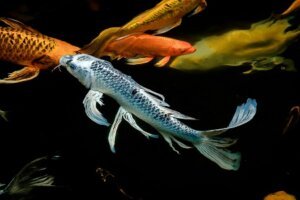
All koi will grow large if raised in outdoor lakes or dams where, not only they have plenty of space to move, hide and grow; but water conditions will likely be ideal.
Not everyone has a lake or dam that they can keep their koi in, so what are the smallest koi fish varieties available for people with smaller ponds?
Butterfly Koi are generally smaller than other varieties of koi fish. They are slender in body and have longer fins and barbels than regular koi. Butterfly koi are the result of a cross between a standard fin koi and an Indonesian carp.
Butterfly Koi make a great addition to aquatic habitats with their graceful long fins. With the right care and environment, these fish can easily live 10 to 15 years!
- Reliable Shipping Directly to Your Door – Toledo Goldfish prides itself on a consistent and dependable shipping process to ensure direct, safe, and timely arrival of your fish.
- Healthy Fish With Live Arrival Guarantee – Step by step acclimation instructions will be included with your order. We stand behind all our products and will either ship replacements or refund your purchase if necessary.
- Born and Raised – All Toledo Goldfish live fish are born and raised on a family farm in the USA.
- High Quality Butterfly Koi – Beautiful mix of koi colors and patterns are visually appealing and sure to stand out in any garden pond, aquarium or tank.
- Please Note – The pictures shown are a good representation of our fish, but not the exact fish you will recei
Prices pulled from the Amazon Product Advertising API on:
Product prices and availability are accurate as of the date/time indicated and are subject to change. Any price and availability information displayed on [relevant Amazon Site(s), as applicable] at the time of purchase will apply to the purchase of this product.
An alternative to koi
An alternative to koi is the popular Shubunkin (a variety of calico colored goldfish). They are popular because they can grow to 9 to 18 inches in length, and they tend to be much hardier than fancy goldfish and koi. This fish is also known for being very active, making them a great addition to any pond.
Shubunkins are sometimes referred to as the “Poor Man’s Koi”.
Of course there are the many varieties of goldfish. Select the long bodied hardier varieties such as comets, sarasa, and shubunkin varieties. Avoid varieties that will succumb easily to predators, competition from other fish in the pond and fish that are delicate such as bubble eyes.
Mini koi ponds
When it comes to creating a small pond, it’s important to choose the best design and design it correctly, so you don’t have to make future changes.
Designing and constructing your own small pond is great because it allows you to do exactly what you want. It should ideally match the nature of your space; you can fit this layout with your porch or garden style.
Can you put koi in a small pond?
It is possible to put Koi in a small pond, but it is not recommended.
Koi can grow up to 36 inches in size, making a minimum size of 300 gallons of water necessary for even two Koi. If the pond is outdoors, it must be at least 3 feet deep.
While a smaller tank may be suitable for two koi in the short-term, in the long-term, the lack of space and water quality may result in the koi becoming unhealthy. Installing a quality koi pond filter will ensure water quality is optimal.
Minimum requirements for keeping koi in ponds
- Having a minimum depth of three feet (so long as the pond doesn’t freeze over in winter- in this case it would need to be deeper).
- Provide a healthy environment for the Koi, by including a variety of plant species near the water’s edge, so they have plenty of vegetation to feed. This also helps the fish feel safe from predators.
- Water filtration rids the water of fish wastes and excess nutrients that lead to algae growth. Less fish means less fish wastes, therefore filtration is not as necessary.
- Adequate well balanced koi food.
Water Quality
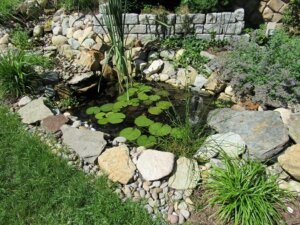
Koi are cold-water fish species but thrive in water with a temperature between 59-77 degrees Fahrenheit.
Maintaining the water quality in a Koi pond is essential for keeping its inhabitants healthy and happy. To achieve this, it is important to ensure that the water has the right chemical makeup.
Pump filters are a great way to ensure a good flow of oxygen and support the ecosystem in the pond.
Additionally, installing fountains in the center and around the edges of the pond can help to provide better oxygenation and make a great visual impact.
Koi can tolerate a wide range of PH, anywhere from 6.5 to 9.0; however, they are happiest between 7.4 to 8.4 (most tap water fits between this range). Having a PH test kit will help with monitoring the water.
How many Koi fish can a 1,500 gallon Koi pond hold?
When it comes to a small pond, you probably won’t be able to keep many koi fish. If you have a 1500 gallon pond, you can comfortably accommodate around seven koi fish without any major issues. However, if you are mixing goldfish with koi fish, you should follow the same guidelines due to the size of the goldfish and the amount of waste they produce.
How many smaller koi fish for a 300 gallon pond?
When it comes to determining how many Koi can fit into a 300-gallon pond, the general rule of thumb suggests one koi per 300 gallons.
However, a 300-gallon pond is usually not large enough to accommodate Koi during the breeding season. Therefore, it is recommended that no more than two individuals of some smaller-sized variety be kept in this volume.
To ensure optimal water quality, it is important to regularly monitor the parameters of the pond and take any necessary steps to maintain those levels.
- Flexible 8x10 Ft Liner: One-piece sheet design lets you make your 270 gal pond the ideal shape to suit your space without being limited by a molded plastic insert; durable non-toxic material is safe for koi, goldfish, and frogs
- Customizable Fountain: Kit includes two interchangeable fountain head nozzles, diverter, and telescopic riser to let you create a water bell or double daisy spray effect, customize fountain height and flow rate, and add an optional waterfall
- Filter-Free 200 GPH Pump: Fully submerged 200 gallon per hour pump (Koolscapes PJ-200) runs quietly with minimal power consumption; filter free design is easy to clean and maintain
- Floating Solar Light and Waterlilies: Kit includes a solar-powered Pond Glo lantern so you can enjoy your pond day or night and realistic lily pads with flowers to add a pop of color to your new pond
- Beneficial Water Feature: Water features benefit both you and your garden by providing peaceful, soothing water sounds and attracting pollinators like songbirds, butterflies, and b
Prices pulled from the Amazon Product Advertising API on:
Product prices and availability are accurate as of the date/time indicated and are subject to change. Any price and availability information displayed on [relevant Amazon Site(s), as applicable] at the time of purchase will apply to the purchase of this product.
Get creative with your containment choice!
Building a small pond doesn’t have to be impossible. When there is no yard available for your small pond, a holding tank can work as an alternative.
You can use large metal tubs or pools as tanks; add rocks and gravel and then add water and a filter to cycle it. Select some floating water vegetation for a more aesthetically pleasing look.
The result is an adorable small pond!
Make a koi-friendly fountain
Creating a beautiful and functional water feature in your garden is easier than you think! By installing a filter system to a pre-existing fountain, you can easily turn it into a pond that is perfect for your family’s koi.
If you don’t have an existing fountain, you can purchase a small one and install it at home. However, installing a fountain for a larger pond can sometimes be a challenge, so it is wise to seek professional help to ensure that your fountain is of the appropriate size and quality to accommodate your koi.
With the right filter and support, you can have a stunning and koi-friendly water feature in your garden!
Adding multiple smaller koi fish ponds
Adding multiple smaller koi ponds to a garden space can be a great way to add beauty and interest to your garden. Not only will they allow you to keep a larger variety of koi, but they will also help to create a more dynamic and interesting landscape.
By creating multiple smaller ponds, you can also avoid having to make drastic changes to your existing gardening and planting space with the excavation of a large pond.
When constructing multiple ponds, it is important to make sure that they look compatible with your existing landscaping. This could mean using similar materials, colors, and textures in order to create a unified look.
Additionally, you may want to consider adding some low-maintenance plants and other features such as rocks and waterfalls to create a more dynamic and interesting space.
Finally, it is important to consider the size and depth of each of the ponds. For example, if you are planning to keep larger koi, you will need to ensure that the ponds are deep enough to accommodate them, and that the ponds are large enough to provide adequate swimming space.
On the other hand, if you are keeping smaller koi, you may want to opt for shallower ponds that are easier to maintain. By adding multiple smaller ponds to your garden space, you can create a beautiful garden landscape.
A small pond at the bottom of a trickling waterfall
A cascading water feature can create a stunningly picturesque scene.
With a little bit of maintenance and the right setup, this can be an easy and cost-effective way to add a serene and calming atmosphere to any outdoor area.
By installing a cascading device, the need for aerators and other pumps in Koi Ponds can be eliminated.
This design is great for smaller ponds and can be installed with relative ease. However, it is important to remember that waterfalls need proper maintenance and care just like ponds do.
With the right maintenance and setup, a small pond at the bottom of a trickling waterfall can be a beautiful addition to any outdoor space.
The ideal pond size for smaller koi fish
The ideal outdoor pond would be 5,000 gallons or more, however, ponds with a volume of at least 1,000 gallons can suffice.
While smaller ponds, such as 300-gallon ponds, can provide a suitable home for a few small Koi, they may not offer enough space for larger koi, or for successful breeding.
A general rule of thumb for pond fish, is to provide 10 gallons of water for every inch of fish.
The larger the pond and the more well-maintained it is, the less risk of damage from factors like disease, stressors, bird predation, and parameter fluctuation. The more space available, means the more Koi that can be safely kept.
Depth of a koi pond
When considering the depth of a small Koi Pond, it largely depends on the temperature of the water.
For outdoor ponds where the temperature drops to 0°C, it is recommended that the depth be 3.5 feet or more. This allows the surface of the water to freeze over while the deeper parts of the pond remains unfrozen and at a temperature that is suitable for the Koi to survive.
Meanwhile, for indoor or temperature-controlled tanks, the depth should be such that the Koi can swim and rest comfortably.
Can koi stay small in a small pond?
Koi can survive in a small pond, but it is important to ensure that their living conditions are ideal for their health and longevity.
Keeping koi in a pond that is too small can cause stress and lead to serious illnesses, which can ultimately result in premature death.
To ensure that koi remain healthy and happy, they must be kept in an environment that meets all their needs. This includes providing ample space, good water quality, and proper nutrition.
With the right conditions, koi can live for many years and remain small in a small pond.
Benefits of building a miniature koi pond
Building a miniature koi pond can provide numerous advantages. It is a great solution for those who can’t have a large pond. Small ponds create a pleasant ambience and provide habitat for native insects, frogs and birds.
Stacking containers like plastic tubs is an inexpensive way to create a smaller pond. Also bath tubs, toddler pools, larger ceramic pots and plastic drums all make excellent small ponds.
The equipment to maintain a miniature pond is also small, easy to handle, and more affordable. However, the maintenance cost of a smaller pond is not necessarily lower than a larger one. Small ponds will require greater maintenance to keep water parameters adequate.
With a miniature koi pond, you can still take advantage of the impressive beauty of koi without the complexity of a larger pond.
Making the transition to larger ponds easier
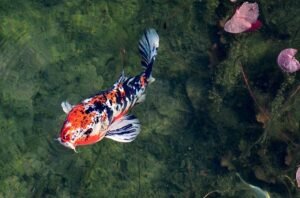
Keeping koi in a larger pond can make things easier for you. All ponds require regular water treatment; however, the smaller the size, the more frequent maintenance is required.
Choosing domestic koi varieties that stay small and can be easier to keep in smaller spaces is better for smaller ponds. Consider Butterfly Koi or goldfish.
Small lakes or dams are the perfect as large koi ponds. These offer the ideal environment for koi to grow and thrive.
Koi are environmental pests in some areas when they escape into local waterways. Be environmentally cautious if you intend using your lake/dam as a koi pond.
How large can koi get?
Tokyo Koi are renowned for their impressive size and are considered to be jumbo Koi fish. These remarkable creatures can grow to an impressive size of over three feet in length!
However, it is important to note that each variety of Koi has its own unique growth pattern. As such, it is not uncommon to see Tokyo Koi reaching a length of up to 30 inches in an aquarium setting.
Final Thoughts – smaller koi fish
Keeping Koi fish in ponds is an excellent option for beginners through to experienced aquarists. It’s easy to find someone to help build and maintain your pond and take care of the fish in your absence.
During maintenance, you should perform a series of tests to check the quality of the water and the pond. To make the pond more aesthetically pleasing, you can add shrubs, walls, umbrellas, and pergolas on the walls to create shade.
A small koi pond is a viable option to consider for small spaces. Selecting smaller varieties of koi, or consider stocking your pond with goldfish will suit small ponds. Koi and goldfish are hardy adaptable fish.
.




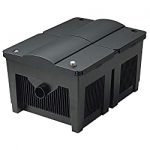
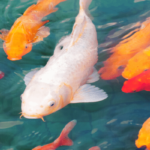


![Aquascaping plants : Beginners to Advanced [Ultimate Guide] Aquascaping plants](https://aquariumhunter.com/wp-content/uploads/2021/11/Nature_style_aquascape-1.png)
